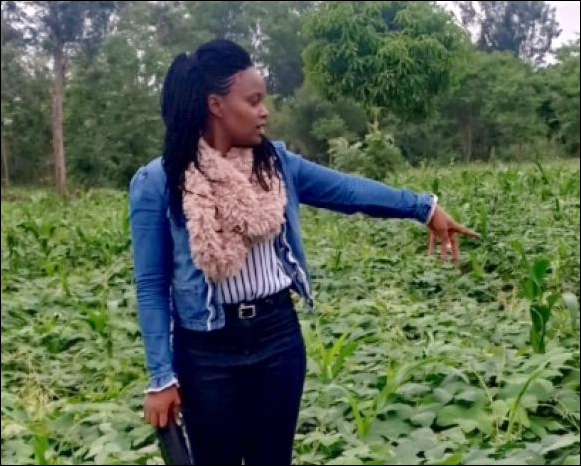
Young Faith Cheruto Korir is a Bachelor of Science graduate with a rare passion. After studying Analytical Science with a bias for organic acids at the Jomo Kenyatta University of Science and Technology, Cheruto, 24, chose to soil her hands in organic farming.
“I was particularly interested in green manuring to improve soil fertility and after a brief stint working for agricultural companies, I started working directly with farmers on consultancy basis. I used the opportunity to research on crops best suited for green manuring,” she says.
“That is how I came across Mucuna Pruriens, a legume with nitrogen fixing components that overrode all others because its roots penetrate deeper into the soil and its leaves are rich in calcium and magnesium,” Cheruto explains.
Cheruto says her research revealed that the legume’s biomass was higher than others from the sheer abundance of its leaves. The resultant foliage manure was richer than others when ploughed back into the soil green or dry. “I learnt that the foliage, when used as fodder improved milk production in dairy animals, an added advantage to the very farmers I was working with,” reckons Cheruto.
Armed with that and more knowledge on the wonder legume, Cheruto set out looking for its seed. But to her dismay, she could not get it in Kenya.
“None of our agricultural research institutions had it. I went to Kenya Agricultural and Livestock Research Organisation, to no avail. I even knocked on the doors of Kenya Medical and Research Institute (KEMRI) on the premise that they would be attracted by its myriad medical components to stock it even from imports, only to hit a cul-de-sac.”
Florida visit
Determined to the hilt to grow the crop locally, Cheruto, under the wings of her Agrivision Consultancy Company that she had registered to further her agricultural pursuits, flew to Florida in the United States of America after Google searches directed her to particular farmers there.
“That was early this year. I returned a week later in March with the precious seed in and equipped with useful skills on how to grow the legume that does best in warm, moist climatic settings. My pioneer crop was planted on half an acre of land I leased in Murang’a County where climatic conditions were optimally favourable. I harvested close to one tonne in August,” she says.
Cheruto’s plan is to increase her acreage under the legume and already has a flowering crop in her native Kericho County.
“My goal is to see more farmers resorting to Mucuna Pruriens as a green natural manure and feed for their livestock,” she states.
She has an elaborate plan on how to spread the message.
“... my next phase will revolve around the plant’s medical aspects to health to improve people’s health in a country where the majority can ill afford medical bills and die or go through life miserably with manageable cases,” Cheruto points out.
Research findings
Cheruto says research has established that Mucuna Pruriens is effective against male and female fertility challenges, neurological afflictions such as Parkinson’s Disease, dementia, depression, forgetfulness and others.
The Kenya Medical Research Institute (KEMRI) in a report dated August 17, 2019 And signed by researcher Dr Peter Mwitari certified the legume fit for human consumption.
The International Livestock and Research Institute (ILRI) of Zimbabwe in its research on the bean confirmed its positive effects on soil fertility through improved yields of other crops grown in its wake or intercropped, with cereals such as maize giving increased yields.
Studies of Mucuna Pruriens’ impact on male and female fertility by its action on hypothalamus /pituitary gonadal axis in the brain was done in India by the Departments of Biochemistry and Urology at the Medical University, Lucknow.
Further research by the British Journal of Medicine and Medical Research discovered enhancing potential of Mucuna Pruriens seeds in female animals and humans.
Besides fertility, scientists say the magic velvet bean serves as an effective aphrodisiac and a natural stimulant if its seeds are processed and taken in recommended doses.
The legume, a native of the tropics does best when planted 40 by 50 cm apart. Its twining stems can extend for two to three metres depending on growth conditions. Its deep purple flowers start showing three months from planting, appearing underneath the foliage. A single plant can produce as many as 100 hairy pods, each holding four to six large, ovoid shaped seeds of white, grey, brown, black or mottled colours. An acre can yield up to two tons if well-tended.
Apart from its medicinal properties, the crop is grown for soil fertility, fodder and as a cover crop in conservation agriculture. Due to its large seeds, Mucuna Pruriens does not require much land preparation.
Want to get latest farming tips and videos?
Join Us
 The Standard Group Plc is a multi-media organization
with investments in media platforms spanning newspaper print operations,
television, radio broadcasting, digital and online services. The Standard Group
is recognized as a leading multi-media house in Kenya with a key influence in
matters of national and international interest.
The Standard Group Plc is a multi-media organization
with investments in media platforms spanning newspaper print operations,
television, radio broadcasting, digital and online services. The Standard Group
is recognized as a leading multi-media house in Kenya with a key influence in
matters of national and international interest.
 The Standard Group Plc is a multi-media organization
with investments in media platforms spanning newspaper print operations,
television, radio broadcasting, digital and online services. The Standard Group
is recognized as a leading multi-media house in Kenya with a key influence in
matters of national and international interest.
The Standard Group Plc is a multi-media organization
with investments in media platforms spanning newspaper print operations,
television, radio broadcasting, digital and online services. The Standard Group
is recognized as a leading multi-media house in Kenya with a key influence in
matters of national and international interest.



